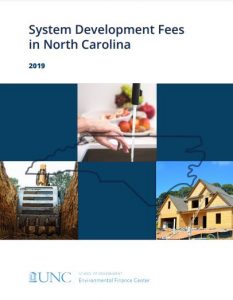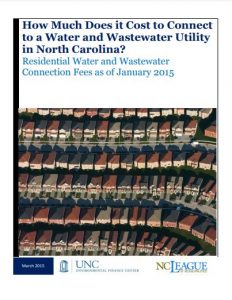When new developments connect to centralized water and wastewater systems, those new customers often benefit from infrastructure that existing customers have already paid for through monthly water and wastewater bills. In other cases, the addition of new customers creates the need to build additional capacity in the system. Elements of built capacity may include water resources, treatment facilities, storage, pumps, and collection and distribution infrastructure. To ensure that new connections pay for the infrastructure costs of the system capacity they will use, some utilities charge a one-time System Development Fee (SDF). These fees are in addition to other connection fees or tap fees, which compensate the utility for the cost of physically connecting the new customer or development to the centralized distribution or collection system.
Prior to 2018, utilities in North Carolina believed they had authority to charge one-time, capacity-related fees under their broad legal authority to charge rates and fees to cover costs. There were no specific legal requirements or guidelines on how the fees could be calculated or to whom they could be charged. The case of Quality Built Homes Inc. v. Town of Carthage in 2016 led to a North Carolina Supreme Court determination that the North Carolina general statutes at the time did not provide wide authority for municipalities to charge capacity-related fees under certain conditions. To clarify the local governments’ authority and conditions by which SDFs could be charged, the North Carolina General Assembly consequently passed General Statute §162A Article 8 (Article 8). Article 8 authorizes local governments to charge SDFs for water and wastewater service under specific conditions and using an approved method to perform a supporting analysis which determines a maximum cost-justified fee. Article 8 went into effect for all such fees starting July 1, 2018 (Fiscal Year 2019).
This 2019 report examines the current legal landscape of SDFs around the state of North Carolina and provides insight into aspects such as calculation methods, residential vs. non-residential SDFs, etc., as well as specific data on fiscal year 2019 fees. Click the link below to download a PDF of the report.
2019 Report On System Development Fees In North Carolina
Spreadsheet: North Carolina Connection and System Development Fees
Report: Cost of Connecting to a Water and Wastewater Utility in North Carolina
Tap Fees and System Development Charges
Wastewater Connections in North Carolina as of January 2009



